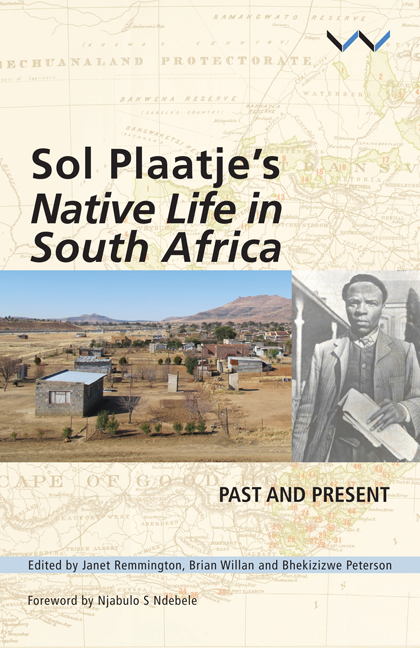Book contents
- Frontmatter
- Table of Contents
- Acknowledgements
- Foreword: Sol T Plaatje and the ‘power of all’
- Introduction: Native Life in South Africa – then and now
- Editions of Native Life in South Africa: 1916 to the present
- Looking Back: Foreword to Ravan Press edition of Native Life in South Africa, 1982
- Poetic Tributes
- A Contemporary Reimagining: The Road to Dikhudung
- Contributors
- Plaatje Resources
- List of Figures
- Index
Foreword: Sol T Plaatje and the ‘power of all’
Published online by Cambridge University Press: 21 April 2018
- Frontmatter
- Table of Contents
- Acknowledgements
- Foreword: Sol T Plaatje and the ‘power of all’
- Introduction: Native Life in South Africa – then and now
- Editions of Native Life in South Africa: 1916 to the present
- Looking Back: Foreword to Ravan Press edition of Native Life in South Africa, 1982
- Poetic Tributes
- A Contemporary Reimagining: The Road to Dikhudung
- Contributors
- Plaatje Resources
- List of Figures
- Index
Summary
Few turning points in history have been expressed with such durable resonance as in the opening sentence of Sol Plaatje's classic text on the distressing effects of a parliamentary promulgation: ‘Awaking on Friday morning, June 20, 1913, the South African native found himself, not actually a slave, but a pariah in the land of his birth.’ Few titles of books capture the impact and urgency of a moment across centuries of time: Native Life in South Africa: Before and Since the European War and the Boer Rebellion. On the morning of June 16, 1976, the children of Sol Plaatje's landless descendants responded in part to the effects of distress that had been legislated sixty-three years earlier. They rose for deliverance.
In a graphic display of a conquest successfully achieved, consolidated and then brutally administered, Plaatje methodically sets out the one-sided gains of victorious English and Afrikaner ascendancy and the dismemberment and destruction of the history and culture of generations of conquered African peoples. South African capitalism flourished on such brutal, legislated foundations. One hundred years later the South African economy is being called to account by a constitutional democracy far more sensitive to the human effects of laws than was the Union parliament of 1913.
Poverty, destitution, homelessness and rootlessness were to be the lot of Africans in their millions. Held all but captive in townships or on farm lands taken away and hostilely owned by those they worked for, their movements severely limited and monitored, the legislated plight of these Africans enabled twenty-five per cent of the population to carry the competitive challenge of building a modern economy. Uncompetitive white farmers and unemployed whites were legislated into economic activity by preference. Being white assured them the edge. If capability was not an immediate factor of selection, it would take the next six decades to become one, albeit in a still overwhelmingly uncompetitive environment.
In Chapter II of Native Life, reproducing parts of the Union Hansard of 1913, Plaatje demonstrates how the Union parliament was made fully aware of the competitive ability of African farmers with respect to their white contemporaries and how they sometimes outstripped them. White parliamentarian J X Merriman of Victoria West was particularly eloquent in his witness. He pointed out that ‘the Natives, if they were well managed, were an invaluable asset to the people of this country’.
- Type
- Chapter
- Information
- Sol Plaatje's Native Life in South AfricaPast and Present, pp. ix - xivPublisher: Wits University PressPrint publication year: 2016



